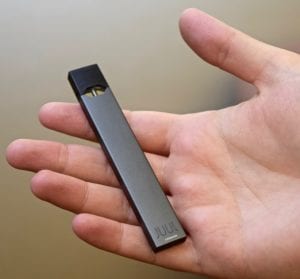Who is a member?
Our members are the local governments of Massachusetts and their elected and appointed leadership.

A Juul brand e-cigarette
On Nov. 27, Gov. Charlie Baker signed a law that will profoundly change the types of traditional tobacco and vaping products available at Massachusetts retailers.
The new policies will become effective at different times. A ban on the sale of flavored vaping products, including mint, menthol and wintergreen, went into effect immediately.
Non-age-restricted retailers, such as convenience stores and gas stations, can sell unflavored or tobacco-flavored vape products with a nicotine strength that does not exceed 35 milligrams per milliliter. Adult-only retail tobacco stores, such as tobacconists and vape shops, are subject to the same sales restriction regarding flavored vape products, but may sell any nicotine strength. “Smoking bars” are exempt from both the flavor restriction and the nicotine strength conditions, but all products purchased by a customer must be consumed on-site.
On Jan. 1, private health insurers, the Group Insurance Commission and MassHealth will be required to provide coverage for tobacco cessation counseling and all generic tobacco cessation products approved by the U.S. Food and Drug Administration, with at least one product available with no out-of-pocket costs for the consumer.
The sale of flavored “traditional” tobacco products, such as cigarettes, cigars, chew/dip/spit tobacco, loose tobacco and snus, will be prohibited at both non-age restricted retailers and adult-only retail tobacco stores as of June 1, but may be sold for on-site use at smoking bars. These restrictions will apply to menthol cigarettes.
Also on June 1, a new excise tax of 75% of the wholesale price of vaping products – both vaping solutions and devices – will bring the products in parity with cigarette prices. The excise tax requires the establishment of a collection system that, among other requirements, will mandate that retailers acquire a state license to sell vaping products.
Smoking bars, commonly known as hookah bars and cigar bars, may permit indoor use of tobacco products if they have received a smoking bar license from the Department of Revenue. Because the term “tobacco product” has been expanded to include vaping, approved smoking bars may now sell and permit the use of vaping products as well.
Smoking bars must be adult-only (21-plus) and must demonstrate to the DOR quarterly that at least 51% of their income is derived from the sale of tobacco or vape products. The new state law permits smoking bars to continue to sell flavored products, but only for on-premise use.
There are about 24 DOR-approved smoking bars statewide, and 128 cities and towns either ban smoking in smoking bars or ban smoking bars altogether. (Early adopters that banned smoking in smoking bars used a traditional smoking definition that omitted vaping, as these products were not on the market yet. A complete ban on the business category of smoking bar includes smoking and vaping of both nicotine and CBD.)
Retailers that sell untaxed vaping products may have their state vape sales license suspended or revoked and their state lottery commission suspended.
No person – retailer or manufacturer – may sell any flavored vape product via the internet to a Massachusetts consumer, but non-flavored vape products that do not exceed 35 milligrams of nicotine per milliliter may be sold with enhanced age-verification systems.
In Massachusetts, 146 cities and towns have the “original” federal-court-tested flavor ban policy in place that exempts from the policy qualifying adult-only retail tobacco stores and smoking bars as well as exempting mint, menthol and wintergreen as flavors. Twenty-three municipalities have expanded their “original” policy to include mint, menthol and wintergreen as banned flavors.
The new state law is expected to affect the progress of seven lawsuits remain against eight municipalities in five counties dealing with local sales policies. Six are individual lawsuits brought by local retailers, and one is brought by Cumberland Farms against seven cities and towns. All focus on the “un-exemption” of menthol, mint and wintergreen, except in two cases where a local policy is being challenged that requires all vape product sales to be limited to adult-only retail tobacco stores.
To help smokers and vapers quit, the state provides free phone counseling at 1-800-QUIT-NOW. For youth aiming to quit smoking or vaping, programs are available at mylifemyquit.com or by texting “VapeFreeMass” to 88709. Minors under 18 wishing to use FDA-approved over-the-counter cessation medications need a prescription.
Cities and towns wishing to encourage municipal employees and residents to quit can order free posters. “Keep Trying” posters, Youth Vaping posters, and a Vaping Fact Sheet are among the items available at massclearinghouse.ehs.state.ma.us/category/TOB.html.
For questions about the new law, contact D.J. Wilson at the MMA or visit www.mass.gov/newtobaccolaw.